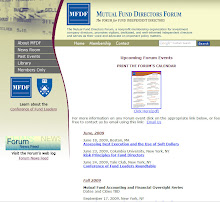SEC Commissioner Troy A. Paredes gave a keynote address at the Forum's Ninth Annual Policy Conference earlier this week. While he touched on a number of topics, much of his address was devoted to his thoughts on how the Supreme Court ought to consider mutual fund fee litigation (the Jones v. Harris case).
Paredes made three points about fee litigation. First, although he noted that although there may not be perfect competition in the fund industry, he did state that the level of competition has increased since Gartenberg was decided, and that "market discipline" therefore does currently provide a significant check on fee levels. Paredes thus concluded that "to the extent the industry has become more competitive, it may argue for greater judicial deference to the bargain the adviser and the fund strike."
Second, Paredes emphasized the importance of directors' business judgment, stating clearly that "courts are not well-positioned to second-guess the business decisions that boards or others in business make in good faith." Paredes argued that courts are instead best-positioned to review the process used by boards to reach their decision on fees, concluding that "these sensibilities cut against reading section 36(b) as implementing a sort of substantive limit on fees and instead recommend that courts focus on the process by which the fees were determined." Paredes then noted that although an unusually large fee might serve as evidence that a board's process was flawed, the possibility that fee could be lower does not warrant judicial intervention -- "the prospect that perhaps a better bargain could have been driven is a slim justification for allowing courts to substitute their business judgment for the collective judgment of independent directors acting in good faith."
Third, Paredes also noted the benefit of predictability. Noting that the courts and the SEC have broad experience in interpreting and applying Gartenberg, he suggested that retaining that test might well provide benefits for all in the industry. He also stated that "the value of predictability would especially be compromised if a new approach to section 36(b) allowed courts meaningful discretion to second-guess good faith business decisions.î"
As SEC Chairman SEC Schapiro noted in her address to attendees at the Policy Conference, the SEC will be filing a "friend of the court" brief in Harris. Commissioner Paredes' remarks on Harris may therefore provide some insight into how the SEC is currently thinking about the issues it will have to address in that brief.
In other portions of his remarks, Paredes also addressed the regulation of money market funds, the regulation of credit rating agencies and the future of the SEC. In particular, Paredes noted the Commission's "75-year track record of commitment, excellence and expertise" and emphasized the importance of retaining an agency committed to taking an "integrated approach ... to overseeing our securities markets."
The full text of Paredes' address can be read at: http://www.sec.gov/news/speech/2009/spch050409tap.htm





